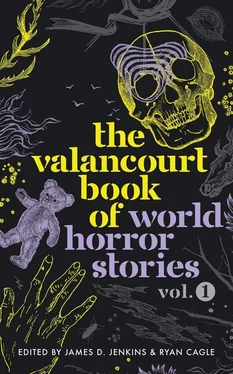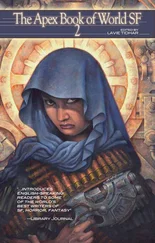The booth was located in the entrance to a street next to the Plaza Mayor, usually well frequented, beside a newspaper and magazine kiosk that at this hour had already closed its shutter, just as the bar across from it was also closed. Hadn’t it closed earlier than usual? It was colder than on the previous nights: that might be why Elias didn’t see anyone else around; cars, yes, the automobiles circulated at almost suicidal speeds, taking advantage of the scant traffic. While he kept his eyes fixed on the slot through which – if all went well – his photos would fall out, expelled from the guts of the machine, Elias thought that he shouldn’t have yielded to the temptation of having his photos taken that night, and specifically in that booth, since in reality he didn’t need them until the following day. He lit a cigarette, nervous, waiting on the sound that would indicate the arrival of the developed photos that were genuinely his, and threw the others on the floor. Ten minutes later he was convinced that the machine really was out of order. His first reaction was to leave; yet he didn’t. He pushed the curtain aside, and, conquering with difficulty his unease at the foul odor, he again performed the same operation as before, beginning with inserting the required coins in the slot. Waiting for the burst of the flash, he was startled at not recognizing himself in the mirror: his eyes were more sunken in their sockets and had bags under them; his hair was whitish and the features he saw reflected were not his. He could feel a tightness in his chest, which always happened when his nerves got the better of him, and he hurriedly left the booth once the four flashes indicated the new photographic operation was underway. His hands trembled; a pair of wrinkled hands with long, yellowish nails. It was colder than before, and, surprisingly, even the cars had stopped traveling through the street, which was now submerged in silence. Nonetheless, in the neighboring Plaza Mayor, the traffic seemed normal, judging from the sound of the vehicles. There could be no doubt that he had been the victim of an optical illusion; the four photographs would drop down shortly, they would be his, he would pick them up and get away from this place, forgetting the disagreeable incident. The anxiety was almost making it difficult to breathe.
The strip of cardstock came out right away. He went on trembling as he picked it up: the individual in the photograph was not him, but it closely resembled the face he had just seen in the mirror. ‘What a lot of nonsense!’ he said aloud, as if trying to justify himself before an invisible witness. ‘The mirror couldn’t reflect any face but mine. I was the occupant of the booth, and I was also the one looking at myself.’ Yes, he had been the model for the photo, but the man photographed was a stranger. The silence that reigned in the street began to weigh on him; not even the traffic from Plaza Mayor reached his ears. What should he do? Get out of there and look for another mirror somewhere else to verify stupidly that he was still the same? Phone one of his friends to come to the photo booth and be witness to such an abnormal occurrence or else confirm that it was just a hallucination? The street had grown dark; the streetlamps were off and not a single light emerged from the houses, as if silence and darkness had conspired to plunge this fragment of the urban landscape into nothingness. He did not even glimpse a weak slit of light coming from a courtyard or a window, nor the flickering of a television in a half-lit bedroom. Despite the insufficient streetlight, from where Elias was standing the Plaza Mayor seemed a movie set illuminated by the strong spotlights of a film team doing a nighttime shoot. ‘That’s all I needed, to have to deal with a power outage now,’ he thought to calm himself. He could understand a power outage, just as he could understand that he had been using a machine that was out of order, but why were no vehicles passing in the street? And above all, why did the light in the booth continue to glow when everything around it was shrouded in a mantle of darkness?
A strong gust of cold wind impelled Elias to take shelter in the booth. From within, holding his breath at times because of the unbearable stench, he heard the whistling of the wind as it kicked up such a racket that it seemed it would drag every sort of object along in its path. He closed his eyes to avoid falling into the temptation of looking at his reflection again, but he couldn’t resist the insane attraction the mirror exerted upon him. What he saw horrified him: the man he saw in the mirror was even older than before; his hair had fallen out, his eyes were sunken, scored with red veins and framed in black circles; his wrinkled face had taken on the same tone as the bags under his eyes. Elias looked at his hands: they were more wrinkled; the nails were long and yellowish. Running his fingers across his face, he noticed the rough feel of the withered skin. In the mirror, the elderly stranger repeated his same gestures, like a sad caricature in a distorting carnival mirror. Was there really such a thing as mirror creatures? Meanwhile the wind had intensified, its concert of malignant whistles growing more acute. Elias, paralyzed by fear, remained for a while listening to the onslaught of the gale against the photo booth. Later he peeked out, pushing the little curtain to the side, but the intense cold made him take refuge again within. Nevertheless, he was sweating, he could feel his clothes sticking to his body.
Mechanically he inserted more coins into the slot, moved by a morbid curiosity, by a strange desire to see the image he had seen reflected in the mirror reproduced in the cardstock, by an urge to abnegate himself in the horror. Then he had to grab hold of the curtain, both he and it whipped by the wind, while he awaited the mechanical delivery of the quadruplicate photo. A sound even stronger than the wind surged from the bowels of the machine and the photo strip was subsequently deposited in the expected place. Unlike the other times, it had fallen upside down, exposing its sickly, provocative whiteness to Elias’s view. And although the wind was very strong, the card did not move a single millimeter from where it had fallen, as if it were held by unseen hands. He turned it over. The photos belonged to the same man as before, deformed by advancing age, but still recognizable despite everything. It was like a vision of what his own old age might be, a light illuminating death’s waiting room. The wind ceased then as suddenly as it had risen, and Elias, although gasping, was able to stand outside the booth. He breathed with difficulty, he must have a fever; his forehead and cheeks felt warm, but when he tried to check by raising his hand to them, the touch of the dry skin grinding against his wrinkled fingers produced in him such a sensation of horror and disgust that he wanted to scream. From his throat no scream came, only a death rattle. He pinched one of his hands so that the pain would pull him out of this bad dream; he hurt himself, but he didn’t wake up from any nightmare; he was awake and he could tell he was dying.
The street was still immersed in darkness. Near the spot where Elias stood, the streetlamps of Plaza Mayor spread their light over the familiar place, over vehicles, stoplights, and houses, but for him the distance seemed to have been multiplied a hundredfold. And though he knew that wasn’t the case, neither was he going to start walking towards the Plaza: he had to have one more photograph taken, to prove to himself that none of what he was experiencing was real, or to demonstrate to the perverse monster in the machine that he wasn’t afraid of it. When he entered the booth once more, he couldn’t remember his name nor did he know why he was there at that late hour, having instant photos taken of himself. He still had some loose coins to insert in the machine. The last ones. He sat on the stool adjusted for his height and looked bravely ahead at the figure in the mirror, almost a skeleton with bones covered by ashen skin and clothed in a suit that hung off him as though he were a coat hanger, like a terrifying mannequin. This time the four flashes fired off by the machine produced a kind of blindness. He could hardly stand, and he had to catch hold of the curtain in order to emerge from the booth. Thus, clutching the rough cloth, he waited for the photos to come out, preceded by the usual noisy din. He strained to pick them up with one hand, without loosening his hold on the curtain with the other, and examined them in the interior light: the four photos were identical, there was no nuance to distinguish one from another, and they consisted of snapshots of a skull, with empty eye sockets and a hollow nasal cavity, its mouth open in a stupid, lipless grin. Elias fell to the ground before he was able to look at himself in the mirror again. The traffic had resumed, not heavy but still noisy. The last thing he saw were the bones of his right hand, which had ended up twisted into a grotesque posture only a few inches from his face, and he dedicated his final thought to imagining the newspaper headline announcing the strange appearance of a skeleton dressed in fashionable clothing inside an instant photo booth.
Читать дальше











